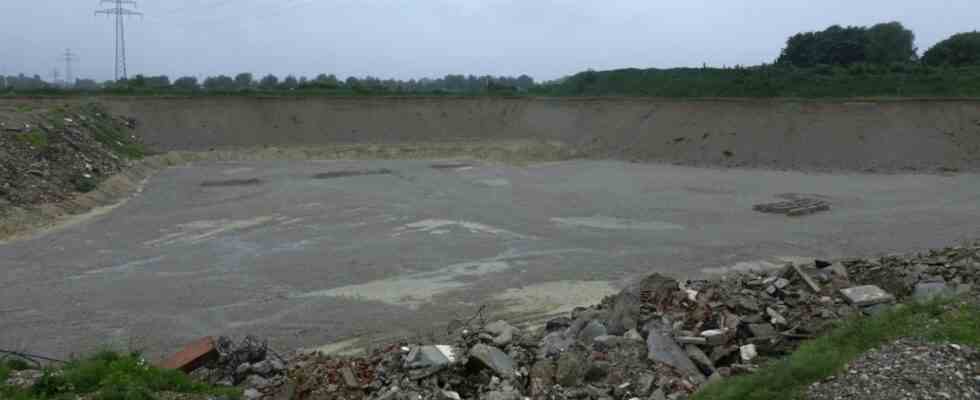When the Gräfelfingen gravel company Glück resumes backfilling the gravel pit on the Martinsrieder Feld, on the property boundary between Planegg and Gräfelfing, after the Christmas holidays on January 9th, this is an expression of a major failure of intercommunal energy policy. The Graefelfing municipal council would have liked to permanently suspend the backfilling of the pit in order to possibly implement an earth pool heat storage system, a pilot project for regenerative energy use. However, joint talks between the two Würmtal communities of Gräfelfing and Planegg, the gravel company and the district office on how the pit could be kept open have not come about. The actors blame each other for the failure.
In a position paper of the “Heat network Würmtal-Nord initiative group”, the signatories – including Martin Feldner, third mayor of Gräfelfing and municipal councilor of the Greens/Independent List, and Angelika Lawo, municipal councilor of the Green Group 21 in Planegg – express sharp criticism of Planegg’s mayor Hermann Nafziger (CSU). They accuse him of destroying “a lighthouse project to combat the energy and climate crisis” and wasting taxpayers’ money amounting to more than 90,000 euros, which the municipality of Graefelfing spent on feasibility studies for the realization of an earth tank heat storage tank. The initiative group bases the allegations on the fact that the municipality of Planegg does not revoke an additional agreement with the company Glück, which provides for high fines if the pit is not filled by the end of 2023.
“A conglomerate of lies and disinformation,” Planegg’s mayor accuses his critics of
In fact, the Gräfelfingen municipal council decided at the end of November to initiate talks with the neighboring municipality, the district office and the Glück company with the aim of rescinding the supplementary agreement and thus gaining time to possibly implement an earth tank storage facility. According to statements by Graefelfing’s mayor Peter Köstler (CSU), however, the managing director of Glück, Markus Wahl, has signaled that he wants to continue with the backfilling, among other things in order to fulfill his contractual obligations. After that, he made no attempt to speak to his counterpart in Planegg.
Doesn’t want to be the “scapegoat”: Planegg’s mayor Hermann Nafziger (CSU).
(Photo: Florian Peljak)
This seethes with anger. Hermann Nafziger said on the phone on Monday that the Gräfelfingen position paper was a “conglomerate of lies and disinformation”. He accuses his party friend, Graefelfing’s mayor Peter Köstler, of “cowardice and underground behavior”. The argument about an earth tank heat storage tank is not conducted honestly. Planegg has never spoken out against the project – on the contrary: In the municipal council decision at the end of November, it was clearly stated that “they didn’t want to stand in the way of the project and gave those involved all the time they wanted”. He could see “no attitude of refusal” in this, but “disregard and an undermining of the Planegg municipal council by the Gräfelfinger and their mayor”.
The round table agreed with Köstler after the municipal council meeting never materialized. “I received neither a call nor an invitation,” said Nafziger. Regarding the matter itself, Planegg’s head of town hall says: The municipality is “not at all able to stop the filling of the open gravel pit with luck”. This is solely a matter for the Munich District Office. Only this authority could, with luck, temporarily suspend Planegg’s additional agreement. Nafziger: “We’re completely up in the air.”
The open gravel pit is largely on Gräfelfinger Grund, only around 3000 square meters belong to Planegg. An additional agreement was concluded years ago “because we were tired of the unreliability of Glück when it came to backfilling and because there was still a discussion about a bypass road,” says Planegg’s mayor. Ultimately, however, Planegg was “not responsible at all”. “I’m fed up with being made a scapegoat.”
Gräfelfing’s Mayor Peter Köstler (CSU) complains that those involved did not pull together from the start.
(Photo: Claus Schunk)
Gräfelfing’s Mayor Peter Köstler is more reserved. He doesn’t accuse anyone of anything, he just notes that the two neighboring communities have different attitudes to the project. Right from the start, everyone involved did not “pull in the same direction”, Planegg had always held back, for example when they did not take part in the feasibility study. But Köstler also admits that he himself “could live with it” if the pit was filled in. In fact, Graefelfing’s mayor has never made a secret of the fact that he considers the pit project to be premature and wants to implement geothermal energy in Graefelfing as a first step.
Accuses the conservationists of wanting to damage his company: Markus Wahl, Managing Director of the company Glück.
(Photo: Robert Haas)
The activists of the heat network initiative group also have to hear allegations. In an open letter to the Gräfelfingen municipal councilor Martin Feldner, Glück managing director Markus Wahl writes that he finds it difficult to support the “heart project” of Feldner and his rascals when they are actually only pursuing the “primary goal” of damaging his company and to deprive her of her livelihood. Meanwhile, the initiative group does not want to shelve the ground pool heat storage tank. “We’ll continue,” said Feldner on Monday. If necessary, the pit would have to be dug again in a few years.

